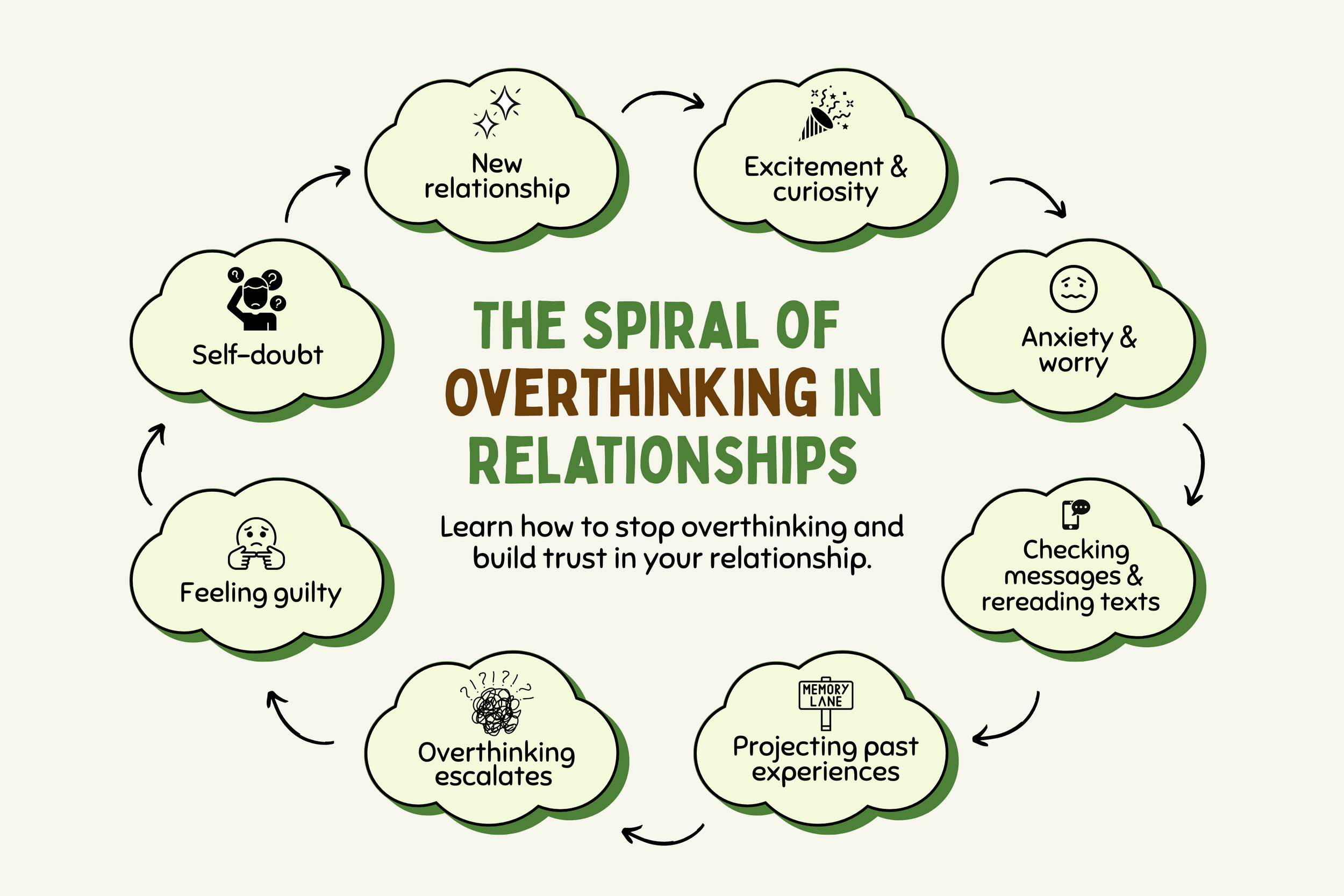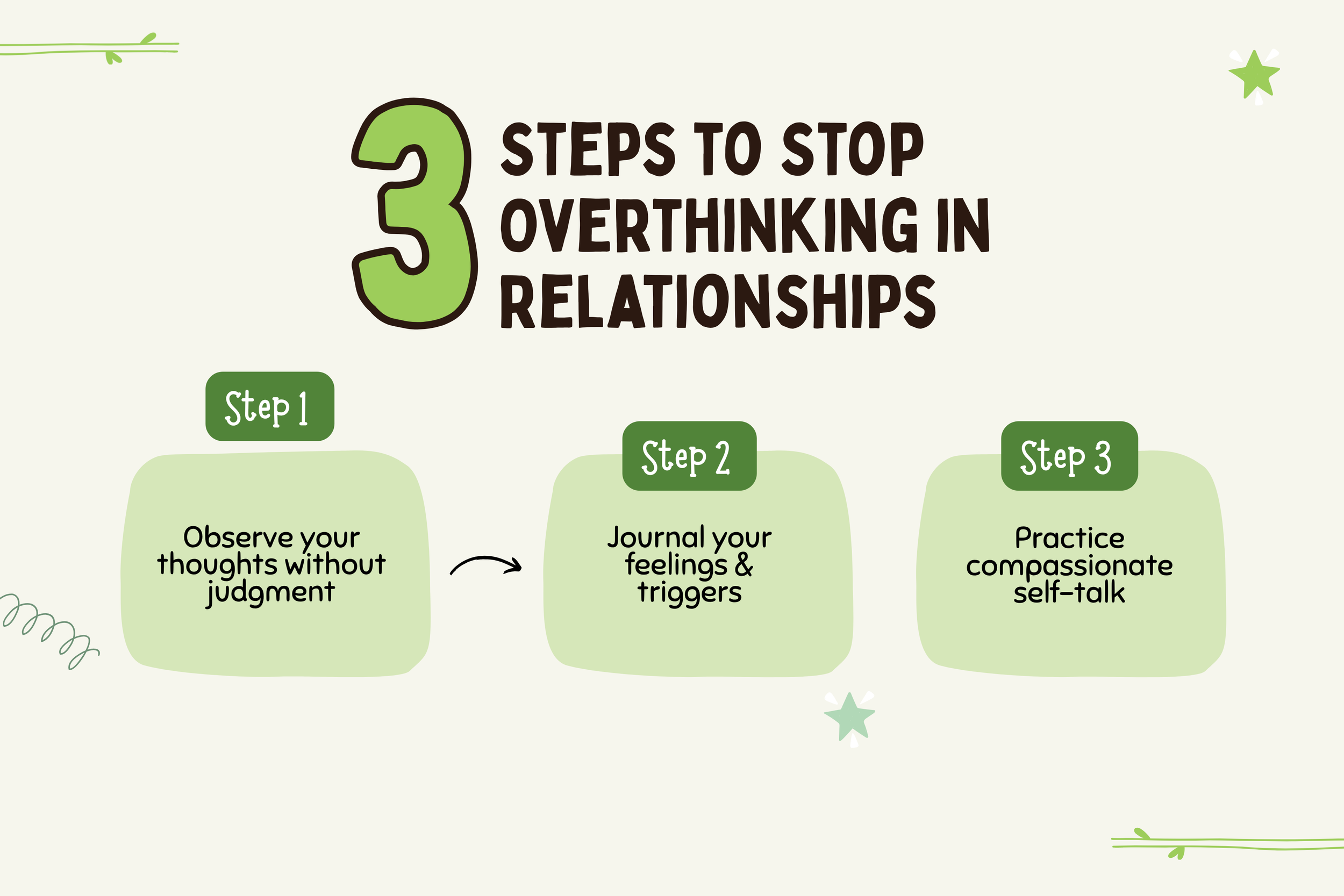Overthinking Your Relationship? We Got You.
Danielle Kardum
The Start of Something New (and Anxious)
Ahhh, new relationship energy! So many of us have been here. You’ve gone on a few dates, you think you might like this person, you start to catch feelings… and then… you start thinking. You start thinking a lot. Maybe you even start overthinking.
You second-guess yourself, reread texts, question your feelings, and start future-tripping. You judge yourself for it and wish you could just STOP.
You are definitely not the first person, nor the last, to struggle with this.
You’re not alone. This is totally human.
Why We Overthink in Relationships
The beginning of a relationship isn’t the only time overthinking can happen—but it’s often where the pattern starts. We can overthink at any time in the course of our connections.
The Role of Uncertainty
I think one of the main reasons we might head down this winding road is because of uncertainty. When we begin a new relationship, there is so much unknown! Entering a new relationship and building a connection takes time. It’s like we are building the plane and flying it all at once.
Oftentimes, with uncertainty, we start to feel anxious. We want predictability, familiar structures, and routines.
The Illusion of Control
We want control. Control is often the illusion of safety, and in relationships, there is so much that is out of our control. Spiraling thoughts represent our futile effort in trying to gain control when faced with the unknown and the risk of getting hurt. In this pursuit of control, we are attempting to ward off the discomfort of the unknown and unfamiliar.
Common Triggers for Spiraling Thoughts
When Your Partner Asks for Space
Experiences in relationships that might trigger these spiraling thoughts can include when our new partner is asking for space. Space and alone time are such a valid need in a relationship, but when this occurs for the first time after the honeymoon period, when the new relationship energy haze has lifted, it can feel particularly personal and jarring.
It can feel like someone is taking away our security blanket. It brings uncertainty and unfamiliarity. We are suddenly faced with a transition from being together all the time to now having space and having to navigate this.
Transition, Feedback, and Intrusive Thoughts
Transition and change can always drum up difficult feelings and sensations, which can be another trigger for spiraling or overthinking. Our partners experiencing difficult feelings or giving us important but critical feedback can also contribute to this.
We might read into things a bit too much, project our own feelings and experiences onto them, making more meaning out of a mood that is just a mood. We could potentially experience intrusive thoughts or fears about the relationship because we are sensitive to our partner feeling on edge.
Past Experiences and Clinical Reasons
We may have been hurt in the past, and our present connection might summon these memories. There are also more clinical reasons for overthinking, such as ROCD (Relationship Obsessive Compulsive Disorder), experiences of relational trauma, abandonment trauma, childhood emotional neglect, and complex PTSD. A therapist can support you in exploring, assessing for, and navigating these.
How Overthinking Impacts Your Relationship
It can be tough to be in a state of constant overthinking when we would rather just be enjoying our connection. Overthinking impacts our ability to be present in the moment, to be receptive to our partner. It can create obstacles in strengthening the connection.
Oftentimes, if we are overthinking, it impacts our ability to build trust. Our partners don’t truly get to know our authentic selves when we are all up in our heads. Not only are we questioning our relationship and our significant other, but we are also nitpicking ourselves. This can erode our confidence over time and can alter the way we see ourselves and the relationship.
Overthinking, when taken too far, can impact our behaviors in relationships. We might suddenly feel an urge to assert more control if our thoughts get the better of us, all in an effort to avoid the discomfort of our fears of getting hurt.
Relationships suffer when they can’t breathe. Relationships suffer when we can’t practice developing trust and acceptance. Overthinking often eclipses these practices.
At Thrive Therapy & Counseling, we provide a safe, supportive space to help you work through your thoughts, ease your mind, and build healthier ways to navigate your relationship. Connect with us here.
How to Stop Overthinking in Relationships
It may seem counterintuitive, but one of the best ways to stop overthinking is to stop trying to stop overthinking. Usually, when we try to stop thoughts, they seem to just get louder. Suddenly, we are thinking so much about stopping the thoughts that we are just as engaged with them as we are when not trying to stop them.
Stop Reading Into Thoughts
One thing we can do, however, is stop reading into these thoughts. Just because you have a thought or worry doesn’t mean it is true or a fact. You don’t need to investigate it. You don’t have to check or seek reassurance for it. These actions will only empower the thought more.
When we check and seek reassurance, it's like we are telling the thought or fear, “Your thoughts are so scary and so real that I must check, I must be reassured.” When we practice observing and accepting our thoughts as just thoughts, we can create distance from them so that they have less power over us.
Visualization and Journaling
Imagining your thoughts as clouds that are just floating by can be a useful practice. As we visualize our thoughts as clouds passing by, we can even practice shrugging our shoulders with surrender and acceptance, “Oh well, that's a thought, it’s just a thought.”
This can take some practice to get used to. So it can be helpful to develop a 5-minute daily practice of just observing your thoughts. Another tool that can be useful in creating awareness and recognizing thought patterns that occur is journaling.
Journaling can also help us in observing our thoughts, recognizing the correlation between overthinking and any external or internal stressors. This practice again helps us in externalizing our thoughts, observing them, and creating distance. Journaling helps us in witnessing thoughts as just responses to our internal or external worlds rather than immediate threats.
Compassionate Self-Talk
Another useful tool when experiencing overthinking is to engage in some compassionate self-talk. Practicing telling yourself:
“It makes so much sense that there is overthinking happening, we are new to this relationship, it is vulnerable, there is a lot of unknown and unfamiliarity, and it is human to want to feel safe.”
When we practice compassion, we are able to experience acceptance rather than judgment. Harsh judgment will only further contribute to feeling unsafe and insecure, which will further exacerbate overthinking and self-doubt.
When Extra Support Is Needed
While I have found these tools to be effective practices in reducing overthinking, sometimes we need extra support. If our overthinking is rooted in trauma, attachment wounds, or experiences of childhood emotional neglect, support from a professional mental health therapist can be extremely helpful.
We all have our blind spots, and sometimes defense mechanisms and maladaptive ways of coping can deter us from uncovering these, leading us astray from ourselves. A therapist can support in bringing a deeper understanding of the self and healing unconscious emotional wounds that might be contributing to our thought patterns and behaviors.
At Thrive Therapy & Counseling, we provide a safe, supportive space to help you work through your thoughts, ease your mind, and build healthier ways to navigate your relationship. Connect with us here.
A Personal Reflection
Many of us have been here, myself included. When I was much younger, before my own therapy journey and the journey of becoming a Licensed Marriage and Family Therapist, I would experience overthinking. Sometimes I still do, and what I have found to be the most useful tool is the practice of accepting my thoughts as just thoughts and practicing compassion for the experience of this stress response.
In doing this, I am practicing establishing a sense of safety within myself, and I think that is what we are all really wanting when faced with the unfamiliar and unknown. This sense of safety is then present within me regardless of what happens. Life is full of unpredictable moments, ups and downs.
And there is no amount of thinking anyone can do to prevent or control this, but when we can distance ourselves from our thoughts, practice self-compassion, acceptance, and even a bit of positive self-talk, we can develop the skills to confront this and tolerate the discomfort that life inevitably brings.
If you want to develop self-compassion, acceptance, and confidence in relationships or want support in managing relationship anxiety, please reach out to us at Thrive Therapy and Counseling. We have several therapists who can assist you in navigating the relationship journey and managing any relationship anxiety or overthinking.



